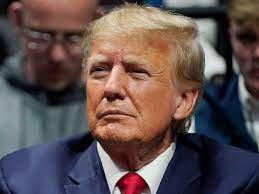Ruth Marcus
With Donald Trump’s announcement that he has been indicted by a federal grand jury, the country has crossed into daunting new territory. But here we are, and at a perilous moment: the country divided over the prospect of prosecuting Trump, the front-runner for the GOP nomination for president in 2024.
We’ve been close to the brink before. Richard M. Nixon escaped prosecution thanks to a pardon from his successor, Gerald Ford. Bill Clinton, in the final hours of his presidency, agreed to a deal with the independent counsel in which he acknowledged giving false testimony under oath, agreed to pay $25,000 in fines and accepted a symbolic five-year suspension of his law license in return for avoiding prosecution. But both Nixon and Clinton were, by and large, exiting the public stage. With the Trump case in the hands of special counsel Jack Smith, we confront the uncomfortable reality of Trump simultaneously under federal prosecution and the leading candidate for the GOP presidential nomination. Yes, Manhattan District Attorney Alvin Bragg has secured an indictment accusing Trump of violating New York law on falsifying corporate records when he sought to buy the silence of adult-film star Stormy Daniels. And, yes, another indictment, from Fulton County (Ga.) District Attorney Fani Willis, going to the heart of Trump’s efforts to overturn the results of the 2020 election, appears in the offing. But there is something far more serious about an indictment by the government Trump led, and wants to lead again, asserting that the former president is a felon. This has been long coming – it was probably inevitable from the moment that FBI agents arrived at Trump’s Mar-a-Lago home last August to execute a search warrant – and yet this step feels staggering.
For me, a seven-count indictment – though we haven’t seen all the specific charges and accompanying details – is an amply justified demonstration of the rule of law in action and the principle that no person, not even a former president, is above the law. At the time of the Mar-a-Lago search, there was a lot of talk, and not just from Trump allies, about whether Attorney General Merrick Garland had overstepped – whether he was transforming a matter of sloppy housekeeping into a federal case. I was not among those doubters, and the evidence that has since emerged only strengthened my conviction that Trump’s behavior was egregious and that his efforts to obstruct justice elevate this episode into the realm of criminality. Among the evidence: reports that Trump aide Walt Nauta told federal agents that he moved boxes of documents at Mar-a-Lago at Trump’s direction. “Investigators now suspect, based on witness statements, security camera footage, and other documentary evidence, that boxes including classified material were moved from a Mar-a-Lago storage area after the subpoena was served, and that Trump personally examined at least some of those boxes,” The Post’s Devlin Barrett, Josh Dawsey and Perry Stein reported in April. And in a sealed opinion, US District Judge Beryl A. Howell found that the crime-fraud exception to attorney-client privilege justified prosecutors’ decision to require Trump lawyer Evan Corcoran to answer questions and turn over notes about the documents search. All this convincingly distinguishes the Trump case from the seemingly parallel situations of former vice president Mike Pence and, more to the point, President Biden, both of whom came forward, in the wake of the Mar-a-Lago revelations, to volunteer that they had found classified documents among their private possessions. The Justice Department has since closed its Pence investigation, and while a separate special counsel, Robert K. Hur, is still probing Biden, there is no reason to think that the Trump and Biden situations are analogous. Biden sought to cooperate with authorities, Trump to thwart them.
The rule-of-law principle that “like cases should be treated alike” means that one official should not be prosecuted for conduct while another goes scot-free – if their conduct is comparable. But it also means that prosecutors should not be deterred from pursuing charges against someone whose conduct they believe was significantly more egregious, even if they will be deluged with unwarranted complaints of unequal and unfair treatment. Which are inevitable – and, indeed, have already erupted, notwithstanding Garland’s decision to place the probe largely in the hands of a career prosecutor serving as special counsel. House Republican conference chairwoman Elise Stefanik (R-N.Y.), who once knew better, called the indictment “the epitome of the illegal and unprecedented weaponization of the federal government” against Trump. The former president protested his innocence in what he referred to as the “Boxes Hoax.” Speaking on CNN the day before the indictment, Pence said that indicting Trump “would be terribly divisive to the country,” adding, “I think it would also send a terrible message to the wider world.” Pence has things half right. Divisive? That goes without saying in these polarized times. The broader message, though, is that the rule of law prevails in the United States, no matter who is accused of wrongdoing. And that underscores why I view an indictment with a mixture of relief and apprehension – relief that Trump has not once again managed to place himself above the law and apprehension about the deeper discord that this development will bring in its wake.
The Washington Post







